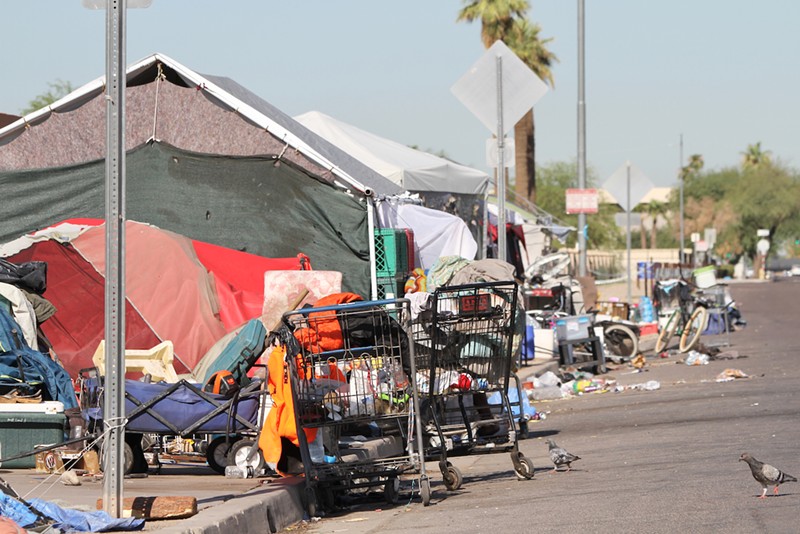****
A judge ordered the city of Phoenix to clear out the Zone, Arizona’s largest homeless encampment.
Maricopa County Superior Court Judge Scott Blaney issued the ruling on Monday as part of the ongoing lawsuit brought by a dozen property owners whose homes and businesses are located in the Zone. Currently, the encampment spans several downtown blocks from 9th to 15th avenues between Jackson and Jefferson streets.
The city estimates that more than 900 unsheltered people call the Zone home. They dwell in tents and other makeshift structures that line the streets. The living conditions are poor, despite relief work being provided by groups such as Human Services Campus.
In August, property owners filed suit against the city, arguing that conditions in the Zone are a public nuisance. The city was "completely abdicating its responsibility" in the neighborhood, plaintiffs' attorney Ilan Wurman said at the time.
After months of deliberation, Blaney sided with the property owners, giving the city until July 10 to clean up, and clear out, the Zone.
"This is a total win for the Plaintiffs — it carefully explains how the City has created this crisis," Wurman wrote in an email to Phoenix New Times on Monday. "This ruling is a win for both the business owners and the unsheltered persons living in the Zone.”
The city said it will continue its efforts to help unsheltered people in the Zone.
“The City of Phoenix is reviewing the specific details of the judge’s ruling as we continue our mission to create safe spaces for people experiencing homelessness," Kristin Couturier, a senior public information officer, wrote in a statement to Phoenix New Times. "The City has, and will continue to invest significant resources toward this urgent need for our most vulnerable residents.”

In December, a judge ordered the city of Phoenix to clean up a downtown homeless encampment called the Zone.
Matt Hennie
An Untenable Situation
The plaintiffs in the lawsuit include the owners of a sandwich shop on Jefferson Street, a couple that owns an art gallery on 11th Avenue, a kitchen rental company, and the owner of a casket manufacturing business in the area.In their original complaint, the property owners argued that while homelessness in the area is a long-standing problem, conditions have worsened rapidly over the past four or five years. Their attorneys further argued that a 2019 decision from the 9th U.S. Circuit Court of Appeals in the case of Martin v. City of Boise was at fault.
The Martin ruling held that cities could not enforce public camping or public sleeping bans against people who had no other shelter available to them. The property owners suggested that after the ruling, the city of Phoenix largely stopped enforcing its public camping ordinances in the Zone. As a result, an influx of people began sleeping on the streets in the area.
The city of Phoenix argued that it was taking steps to address the problem. The city’s attorney, Aaron Arnson, claimed during a November hearing that the city is "attempting to go above and beyond" and pointed to the creation of a new city office dedicated to homelessness as an example. He also cited the November announcement that the city would clean the area by restarting its controversial sweeps of the Zone.
However, Arnson’s main argument centered around his claim that the city has discretion over how it handles policy questions about homelessness. Such decisions were not a matter for the courts, he argued.
Blaney disagreed.

Joseph Gorden, who lives in the Zone, said sweeps of the Zone the city restarted in December were a hassle but that he was unfazed by them.
Katya Schwenk
A Public Nuisance
Blaney's ruling on Monday sided with the property owners on nearly every key issue raised in the case. He declared that the city had chosen to "forgo enforcement of criminal, health, and other quality-of-life statutes and ordinances in the Zone." Blaney also agreed that there had been a "dramatic increase" in crime in the area over the past five years and that the area is an environmental hazard. “[The situation has] gotten progressively worse, not better, since 2018 and has become dire since November of 2021,” Blaney said in the ruling.
Crucially, Blaney found that the city was causing the concentration of people in the Zone by declining to enforce various criminal ordinances in the area. He used lurid language to demonstrate this point: The city had, he said, "created a classic 'siren song' to certain individuals that are enticed at their peril by the Zone's drugs, sex, and lack of societal rules."
The judge ordered that the city cannot continue to "maintain a public nuisance on the public property in the Zone." This means getting rid of tents and other structures, "biohazardous materials," and those individuals committing criminal offenses. Compliance should be achieved, the judge continued, by July 10, although he did not give additional guidance for how, exactly, the city should achieve this.
What comes next for the hundreds of people living in the Zone is not yet clear.
Complicating Blaney's ruling is an ongoing ACLU lawsuit filed in December, which challenged the city's sweeps of homeless encampments. U.S. District Court Judge G. Murray Snow issued an injunction on December 15 that restricts the city from issuing loitering citations to the Zone’s residents unless the city can prove that the individuals are refusing to use available shelter space. Snow’s injunction also ordered the city to stop seizing property without notice.
Elizabeth Venable, an organizer with the Fund for Empowerment, an advocacy group for unsheltered people, called the ruling “stigmatizing" and said it conflicts with the injunction in the ACLU lawsuit.
“It essentializes houseless people, suggesting that they are nearly all nuisances themselves,” she said. It seemed to have “very little empathy for unsheltered individuals,” Venable added.
The ACLU declined to comment on Blaney's ruling to clear out the Zone.
The city also is under investigation by the U.S. Department of Justice for its treatment of people who are unsheltered, including the destruction of their property.









